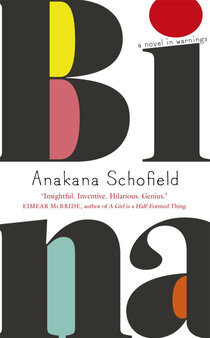
I can’t help associating Anakana Schofield with the Goldsmiths Prize. I read her for the first time when her previous novel, Martin John, was shortlisted for the Goldsmiths in 2016, and now here we are again with Bina.
Like Martin John, Bina was a minor character in Schofield’s first novel Malarky (you don’t need to have read Malarky to enjoy Bina – I hadn’t – but there are several references to the earlier book). In Malarky, 70-something Bina was arrested for taking a hammer to an aeroplane at a protest. Now she spends much of her time in bed, with medical waste in her garden, and assorted activists camping outside the house as the threat looms of being arrested again.
I described the novel Martin John as being organised to create meaning for its protagonist rather than the reader. Bina runs along similar lines: although its narrator wants to tell her story and be heard, she’ll do it in her own time and her own way. This involves scribbling on the back of receipts and whatever paper she can find, which explains why some sections break down into short single-sentence paragraphs on the page. Bina is a choppy novel to read, reflecting its main character’s restless mind.
Bina’s account revolves around three characters: her late friend Phil (Philomena), the protagonist of Malarky; her ex-lodger Eddie; and the mysterious Tall Man, who recruited Bina for something that I’m not going to reveal. These characters exist in the novel more as shadows than presences (at least, so I found). Their stories grow out of oblique snippets (such as Bina commenting that she found Eddie in a ditch), and only gradually does it become apparent what has been going on in Bina’s life, and how the dark the book will grow.
Bina is subtitled “A Novel in Warnings”; Bina herself is clear what she’s about:
I’m only telling you this to warn you. I’ve better ways to waste my time than mithering on here. I’m a busy woman. Of that be certain. People think old women have nothing to do but stand around. They’re very wrong and very ignorant and do take that last combination of wrong and ignorant as another warning. If people think you have time to stand about, let them know otherwise, by not standing about. Take off! Take off when they least expect it.
So, Bina has several types of warnings for her readers: warnings not to do certain things, to walk away from certain situations – but also not to make assumptions about people or overlook those left in the margins.
My abiding memory of Bina is of a deeply affecting book. I didn’t realise how much it had affected me until the end. Those stories unfolding obliquely within the novel got under my skin, and I hadn’t noticed. But I’ll remember that feeling, long after turning the final page.
Published by Fleet.
Click here to read my other reviews of the 2020 Goldsmiths Prize shortlist.
Recent Comments